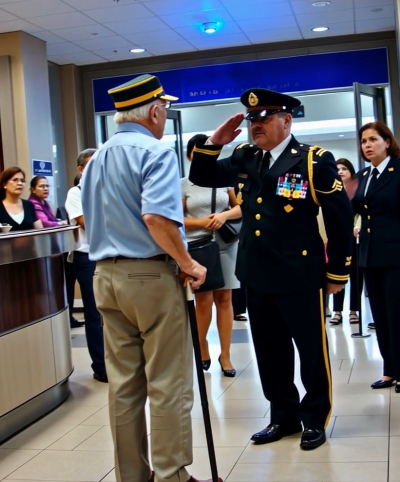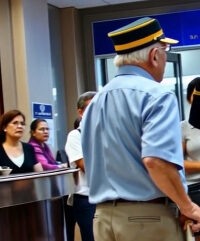
The air inside Summit Ridge National Bank buzzed with quiet chatter and the occasional shuffle of papers as customers went about their morning routines. Bobby Keene, a man whose life was defined by service but whose demeanor was modest, waited patiently in line. The black cap perched on his head, marked “Korea/Vietnam Veteran,” was more than a simple accessory—it was a symbol of honor earned through years of sacrifice. In his pocket, he carried his VA card, discharge papers, and a brass challenge coin—tokens representing camaraderie, duty, and devotion.

When Bobby finally reached the teller, the young employee eyed his ID with suspicion. The manager, Caden, stepped over, a smirk tugging at his lips. “This looks like something typed on an old typewriter,” he sneered, dismissing the worn documents with a casual wave. Bobby calmly displayed his challenge coin, a revered emblem among veterans, but Caden, misunderstanding its significance, waved it off as a “cute trinket” probably bought online. The insult cut deep: Bobby was being accused of faking his service. Caden then summoned security to escort him out.
Seated quietly on a nearby bench, Bobby remained composed, his dignity unshaken despite the stifled laughter and whispers from bystanders. He had no need to argue—he knew the value of his experiences far outweighed the opinions of those who couldn’t comprehend them. Yet not everyone overlooked the importance of what Bobby carried. Maya Rodriguez, a former Air Force specialist, noticed the incident and recognized the coin instantly for what it truly represented—honor, sacrifice, and service.
“You’ve made a grave mistake,” Maya said firmly, stepping up to confront Caden, halting the snickers and murmurs around them. Ignoring his dismissive shrug, she left the bank, her mind racing to reach someone who could correct this wrong.
Meanwhile, an older staff member overheard the name Keene and glanced at the bank’s commemorative plaque honoring past leaders, one of whom was Bobby himself. Realizing the gravity of the situation, he quickly made a phone call: “It’s Bishop Coyne. Summit Ridge. He’s here.”
Outside, Bobby sat calmly, eyes fixed on the American flag flapping in the morning breeze. Each movement of the fabric reminded him of battles fought both overseas and within his own life. Unbeknownst to the bustling bank, reinforcements were on the way.
Miles away, General Robert Whitaker slammed his phone down, his face tight with indignation. The thought that a veteran, particularly one of Bobby’s stature, could be treated with such disrespect was unacceptable. With deliberate urgency, he donned his uniform, fastening each button with purpose. His goal was clear: to ensure Bobby’s service, and that of all veterans, was honored and acknowledged.
The General’s drive to Summit Ridge was swift. As he neared the bank, the flags along the street seemed to ripple with renewed vigor, as though acknowledging the arrival of someone who embodied the values they represented. Inside, the atmosphere shifted from casual dismissal to tense anticipation, the presence of authority drawing every eye.
When the doors swung open, General Whitaker entered, his gaze scanning the room until it settled on Bobby. Without a word, he strode toward him, offering a crisp salute—a gesture of both respect and apology. Silence fell over the bank. At that moment, Bobby’s legacy was recognized not merely by the insignia on his cap, but by the community witnessing the honor finally being given where it was long overdue.


